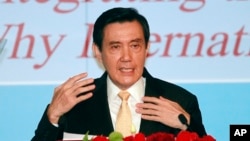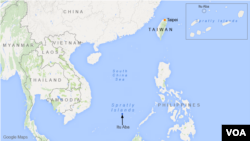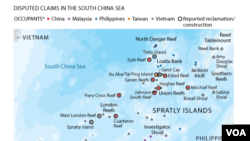The president of Taiwan, a staunch but overlooked claimant in Asia’s biggest maritime territorial dispute, flew to a contested island Thursday to send a signal that has reached as far as Washington.
President Ma Ying-jeou boarded a military aircraft before 9 a.m. for Itu Aba, a tropical atoll in the South China Sea also known as Taiping Island. He visited about 200 people stationed there as coast guard personnel, medical workers and scientific researchers before returning to Taipei by evening.
Ma called for “peaceful” development of Itu Aba, citing infrastructure developments including a 10-bed hospital and a lighthouse.
"All this evidence fully demonstrates that Taiping Island is able to sustain human habitation and an economic life of its own. Taiping Island is categorically not a rock, but an island," he said, adding it will be transformed into an island for peace and rescue operations, as well as an ecologically friendly and low-carbon island.
“In other words, we have these services related to peace and humanitarian work,” Ma said at a news conference in Taipei upon his return from the island. “We can develop those on the island and extend them to fishermen or people from nearby places.”
“President Ma emphasizes that Taiping Island is an inherent territory of the Republic of China,” his spokesman Charles Chen said Wednesday, using the constitutional name for Taiwan.
Ma's visit to the islet 1,600 kilometers away from Taiwan follows an unusually stern statement this week from the foreign ministry calling the sea's four major tropical island archipelagos parts of the Republic of China under international laws.
The Republic of China is Taiwan's legal name. The statement says Taiwan has “stood by” Itu Aba and other islets for 60 years.
Regional dispute
The president's visit may help spotlight Taiwan's position.
Despite its claim to nearly the whole 3.5 million-square-kilometer sea, Taiwan normally struggles to get attention for lack of diplomatic relations in Asia. China, the most powerful claimant in the maritime dispute, says Taiwan itself belongs to Beijing and forbids other countries from forming diplomatic ties.
Taiwan has built Itu Aba, an atoll covering half a square kilometer in the Spratly archipelago, into a coast guard outpost with solar energy projects and medical staff to help storm-battered ships.
Those developments on the ocean's largest natural islet are parts of Taiwan's effort to gain international attention. In a statement Thursday, the president called for “peaceful” use of Itu Aba.
Analysts say other claimants around the South China Sea are more likely to protest Ma's visit than endorse development on the islet.
Five other governments claim all or part of the sea that stretches from Taiwan southwest to Singapore. Ma's trip to the waters comes as China landfills other islets and the Philippines protests the basis for China's claims to a United Nations tribunal.
Taiwan uses a nearly identical basis.
US reaction
On Wednesday the U.S. State Department called the Taiwan leader's trip unhelpful to easing disputes in the South China Sea.
“Frankly, we’re disappointed," State deputy spokesperson Mark Toner said. "We view such an action as unhelpful and does not contribute to the peaceful resolution of disputes in the South China Sea. We urge Taiwan and all claimants to lower tensions and deescalate tensions rather than taking actions that could possibly raise them.”
Vietnam, another claimant that has landfilled some of the ocean's 500 islets, normally protests when Taiwan tries to shore up its claims.
China may also sound off despite efforts under Ma's eight-year tenure to improve relations. Ma must step down in May due to term limits and hand power to the opposition party's president-elect, Tsai Ing-wen.
The opposition party has chafed with China in the past and Tsai said last year that if elected she would pursue dialogue with all governments with stakes in the South China Sea. Beijing would protest that move to block those countries from strengthening ties with Taiwan.
But China is unlikely to take action now at the risk of offending the United States, said Shane Lee, a political scientist at Chang Jung Christian University in Taiwan. Washington wants all claimants to work harder on getting along.
“[China] will be irritated at least, probably make some noise and so on,” Lee said. “I don't think they will take any actions, because the Americans are there, too.”
"On the one hand, Taiwan ... [doesn't] want to give up the claims of China," said Jerome A. Cohen, a China legal scholar and professor at New York University, speaking at a discussion hosted by the Asia Society on Wednesday. On the other hand, he added, Taiwan lacks the formal diplomatic ties within the UN system to challenge competing claims such as the lawsuit the Philippines’ lodged against China at The Hague.
Cohen instead urged Taiwan to aim to become the "Switzerland of Asia," opening Taiping to all international entities for conferences, negotiations, research and dialogue, and thereby asserting a new conciliatory in the disputed maritime region.
Competing claims
Brunei and Malaysia also claim parts of the sea. Competing claims have sparked occasional clashes between vessels since the 1970s. In 2014, Chinese and Vietnamese boats jousted after Beijing allowed an oil rig to be stationed off Vietnam's coast.
The South China Sea is rich in fisheries as well as possible reserves of oil and natural gas below the seabed. Half the world's shipping traffic by tonnage also passes through the sea.
The islets, many submerged in high tides, have no indigenous population.
Political experts in Taiwan say President Ma considers the Itu Aba visit a key personal milestone.
He has been criticized at home for forming ties too fast with Beijing and being too soft on foreign policy. The opposition's president-elect was invited on the trip but declined without giving a reason.














